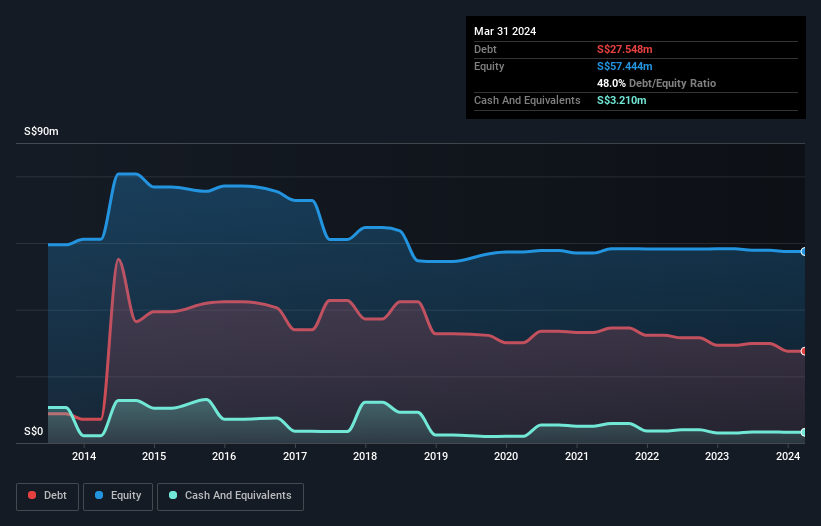Some say volatility, rather than debt, is the best way to think about risk as an investor, but Warren Buffett famously said that 'Volatility is far from synonymous with risk.' So it seems the smart money knows that debt - which is usually involved in bankruptcies - is a very important factor, when you assess how risky a company is. We can see that Casa Holdings Limited (SGX:C04) does use debt in its business. But is this debt a concern to shareholders?
Why Does Debt Bring Risk?
Debt and other liabilities become risky for a business when it cannot easily fulfill those obligations, either with free cash flow or by raising capital at an attractive price. In the worst case scenario, a company can go bankrupt if it cannot pay its creditors. However, a more frequent (but still costly) occurrence is where a company must issue shares at bargain-basement prices, permanently diluting shareholders, just to shore up its balance sheet. Of course, plenty of companies use debt to fund growth, without any negative consequences. The first step when considering a company's debt levels is to consider its cash and debt together.
View our latest analysis for Casa Holdings
What Is Casa Holdings's Debt?
The image below, which you can click on for greater detail, shows that Casa Holdings had debt of S$27.5m at the end of March 2024, a reduction from S$29.3m over a year. On the flip side, it has S$3.21m in cash leading to net debt of about S$24.3m.

How Strong Is Casa Holdings' Balance Sheet?
The latest balance sheet data shows that Casa Holdings had liabilities of S$7.58m due within a year, and liabilities of S$28.0m falling due after that. On the other hand, it had cash of S$3.21m and S$3.40m worth of receivables due within a year. So its liabilities total S$28.9m more than the combination of its cash and short-term receivables.
Given this deficit is actually higher than the company's market capitalization of S$20.8m, we think shareholders really should watch Casa Holdings's debt levels, like a parent watching their child ride a bike for the first time. In the scenario where the company had to clean up its balance sheet quickly, it seems likely shareholders would suffer extensive dilution. There's no doubt that we learn most about debt from the balance sheet. But you can't view debt in total isolation; since Casa Holdings will need earnings to service that debt. So if you're keen to discover more about its earnings, it might be worth checking out this graph of its long term earnings trend.
Over 12 months, Casa Holdings made a loss at the EBIT level, and saw its revenue drop to S$22m, which is a fall of 5.4%. We would much prefer see growth.
Caveat Emptor
Importantly, Casa Holdings had an earnings before interest and tax (EBIT) loss over the last year. Indeed, it lost a very considerable S$2.3m at the EBIT level. When we look at that alongside the significant liabilities, we're not particularly confident about the company. We'd want to see some strong near-term improvements before getting too interested in the stock. Not least because it burned through S$402k in negative free cash flow over the last year. That means it's on the risky side of things. The balance sheet is clearly the area to focus on when you are analysing debt. However, not all investment risk resides within the balance sheet - far from it. For example, we've discovered 5 warning signs for Casa Holdings (3 make us uncomfortable!) that you should be aware of before investing here.
When all is said and done, sometimes its easier to focus on companies that don't even need debt. Readers can access a list of growth stocks with zero net debt 100% free, right now.
New: AI Stock Screener & Alerts
Our new AI Stock Screener scans the market every day to uncover opportunities.
• Dividend Powerhouses (3%+ Yield)
• Undervalued Small Caps with Insider Buying
• High growth Tech and AI Companies
Or build your own from over 50 metrics.
Have feedback on this article? Concerned about the content? Get in touch with us directly. Alternatively, email editorial-team (at) simplywallst.com.
This article by Simply Wall St is general in nature. We provide commentary based on historical data and analyst forecasts only using an unbiased methodology and our articles are not intended to be financial advice. It does not constitute a recommendation to buy or sell any stock, and does not take account of your objectives, or your financial situation. We aim to bring you long-term focused analysis driven by fundamental data. Note that our analysis may not factor in the latest price-sensitive company announcements or qualitative material. Simply Wall St has no position in any stocks mentioned.
About SGX:C04
Casa Holdings
An investment holding company, engages in the trading of electrical and electronic home appliances, kitchen and bathroom fixtures, and accessories in Singapore, Malaysia, Morocco, and internationally.
Solid track record with adequate balance sheet.
Market Insights
Community Narratives



